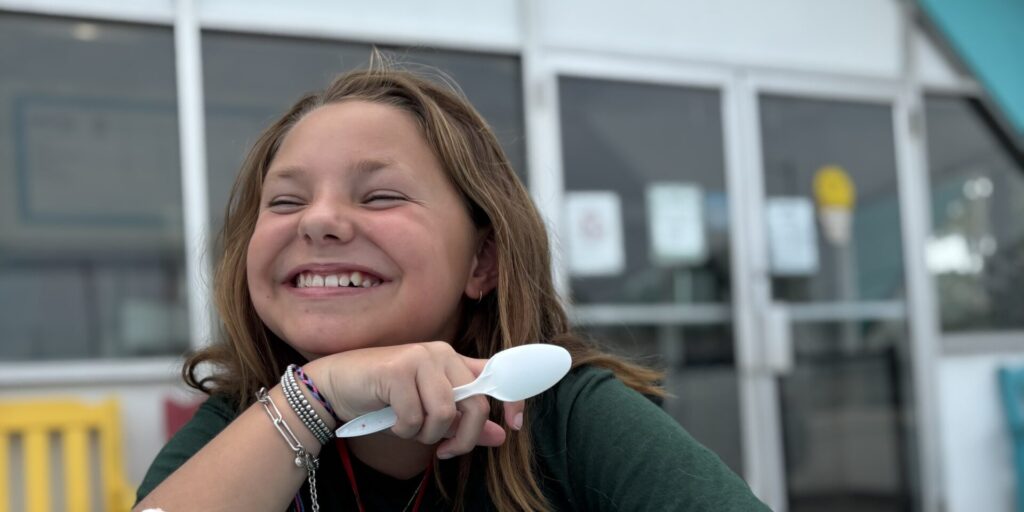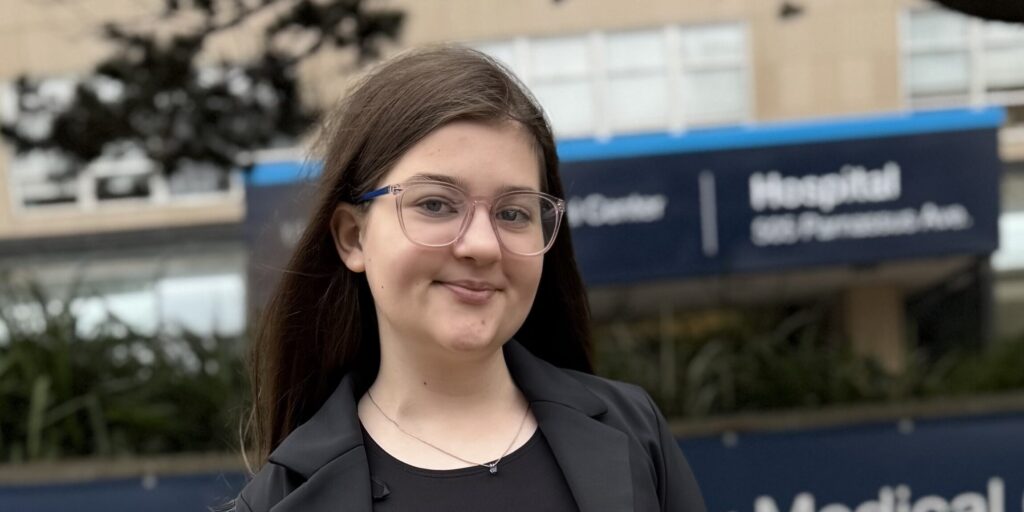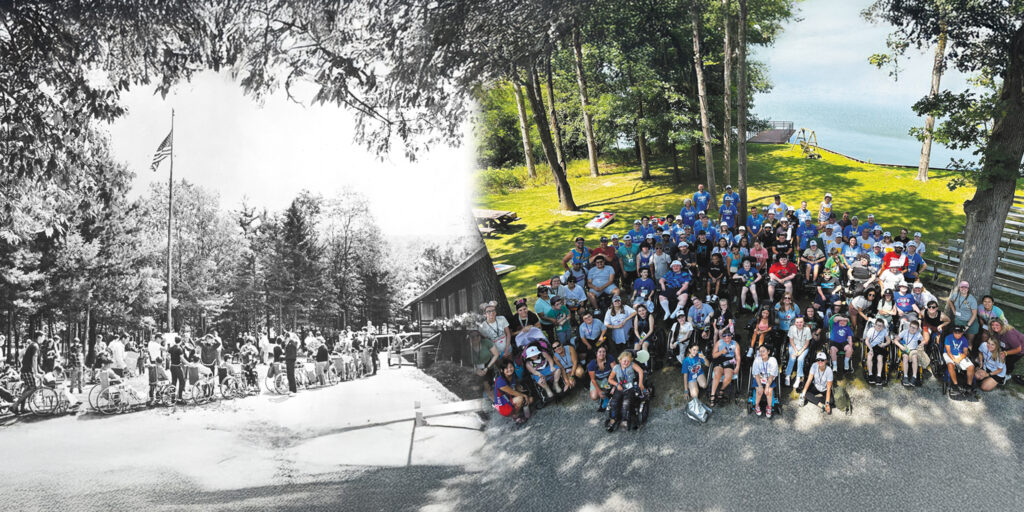
MDA Summer Camp Magic
By Kelly Berger | Tuesday, August 19, 2025
In 1955, MDA held its first Summer Camp in Sussex, New Jersey. Sixteen campers from New York boarded a bus and headed to a rustic yet accessible campsite, where they explored and built camaraderie, free from the typical physical and societal limitations.
One of the first to be led by a voluntary health organization, this innovative summer camp experience was offered exclusively for kids living with muscular dystrophy.
The pilot program was a success. MDA Summer Camp is now celebrating its 70th year. Today, at MDA’s nationwide network of camps, youth with neuromuscular diseases can have traditional camp experiences — enjoying outdoor adventures, discovering new interests, and making lifelong friends — in a barrier-free environment. Many former campers credit their time at Summer Camp with helping them build the self-confidence and independence they need to take on everyday challenges well beyond their camp years.
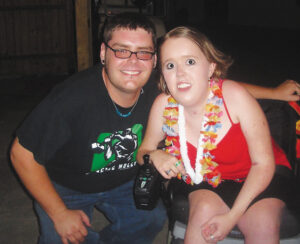
Camper Kelly Berger with counselor Tyler Snow in 2006
As one of those former campers, I have such fond memories of the five years I attended Summer Camp in Louisville, Kentucky. I’m 36, living with collagen VI muscular dystrophy, and I still reminisce about Summer Camp with the friends I made there more than two decades ago. It was a week where I lived freely, felt like a star, and celebrated my achievements, big and small. It was a welcome break from focusing on my physical limitations — at camp, anything is possible.
What’s Special About Summer Camp?
MDA Summer Camp is a week-long overnight camp for kids and young adults ages 8-17 who have been diagnosed with neuromuscular diseases. From the beginning, MDA has provided Summer Camp at no cost to families.
Each camp location is unique in its features and facilities, but all are safe and accessible for campers with neuromuscular diseases. In addition, volunteer medical professionals and counselors are trained to meet every child’s healthcare needs and provide physical and emotional support, so campers can fully enjoy the camp experience.
“We are able to utilize equipment and technologies that are specifically designed for campers with disabilities to be able to enjoy the magic and freedom of being a kid at summer camp,” explains Kelsie Andreska, MDA’s Director of Recreation Programs.
This allows them to participate in quintessential summer camp activities, like fishing, swimming, and horseback riding. But being at Summer Camp means so much more than trying archery or ziplining. It means getting to know your cabinmates and giving your cabin a creative nickname. It means showing your camp spirit with flags and spirit sticks, dressing up for theme days, and joining campfire sing-a-longs — with s’mores, of course.
Camper favorites vary from epic talent shows to Sponsor Days featuring exciting visitors to the unforgettable dance on the final night. Experiencing these activities while surrounded by other youth living with disabilities and embracing a new level of independence creates a magic that is unique to MDA Summer Camp.
Alicia Dobosz, MDA’s Executive Vice President of Community Engagement, has witnessed firsthand how campers transform, even in the few short days after their arrival, learning to advocate for themselves and create new dreams for the future.
“This incredible change is undoubtedly due to the support, camaraderie, and connection that is almost palpable from the minute you enter camp,” she says. “There’s a certain magic about it that’s hard to describe unless you’ve experienced it.”
The Best Week of the Year
Campers, both new and seasoned, have one echoing parallel: Attending MDA Summer Camp is their favorite week of the year.
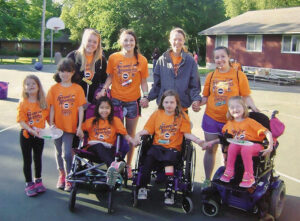
Sophia Dipasupil (front row, third from left) with camp friends in 2015
Sophia Dipasupil, 18, of Minnesota, who lives with juvenile dermatomyositis and attended Summer Camp for 10 years, found that “being around others who could understand me made it easy to be far from home. I got to experience things I never had the opportunity to do before, like ziplining, pontoon boat rides, and horseback riding,” she says.
That rings loudly for Sory Rivera, 37, of Texas, a 17-year Summer Camp veteran who lives with spinal muscular atrophy (SMA). She adored the week-long getaway that brought her out of her shell. “I remember having the time of my life and bawling my eyes out when I had to leave,” she says.
Brothers Caden Sanchez, 21, and Cody Sanchez, 18, of Wisconsin, who both live with LAMA2-related muscular dystrophy (LAMA2-RD), attended nine years of Summer Camp together. “It’s a week to be free and have fun and not feel different than anyone else,” Cody says.
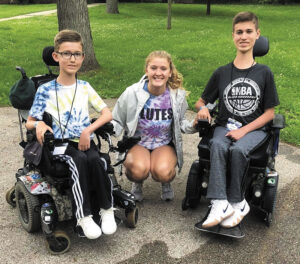
Cody (left) and Caden (right) at camp with their sister Cassidy, a counselor, around 2015
Caden and Cody were often in different cabins, and one of their favorite activities was being rivals in adaptive sports like basketball or baseball. “We would always compete against each other’s cabins and try to win. We were very competitive,” Caden says.
The Sanchez brothers also enjoyed swimming, and Cody particularly liked building pinewood derby cars. He raced the finished cars in tournaments and received medals for winning. Both brothers looked forward to Sponsor Day, when local fire fighters would visit and play baseball with the campers.
Finding a Community
For Caroline LeMay, 27, of Massachusetts, who lives with collagen VI muscular dystrophy and attended camp for eight years, her fondest Summer Camp memories involved bonding with her cabinmates and counselors. Those years were formative in building friendships with the women she calls sisters. “It was the first time I met people who could understand the disability experience,” she says.
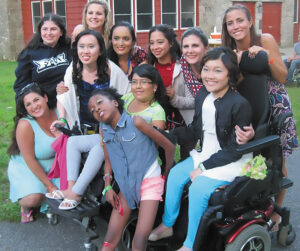
Caroline LeMay (standing, second from left) and friends dressed up for the camp dance in 2013
Even when camp friends are separated most of the year, the distance is no barrier to longevity, according to Sophia. “To this day, my friends from camp inspire me in so many ways. The memories we made together and the impressions they’ve made on my life will last forever,” she says.
These strong friendships formed a secure base that helped her build self-confidence. “The sense of community I felt helped me realize that I’m not alone and that we are all stronger because of each other,” she says. “It helped me see and believe that my opportunities and life experiences are not limited.”
Building Confidence
Feeling empowered seems to come naturally for campers when they are surrounded by others like them.
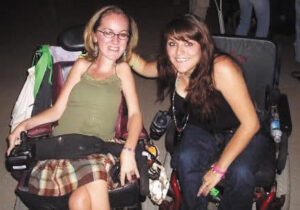
Sory Rivera (right) and a friend at a camp dance
in the 1990s
To Sory, Summer Camp was a safe place where she fully embraced herself. “If I hadn’t gone to MDA Summer Camp, I wouldn’t have blossomed in the way I have with my confidence,” she says.
At Summer Camp, for the first time, Sory didn’t feel like her 400-pound power wheelchair was a barrier to inclusion. She participated in fishing, boating, and even climbed a three-story wall — all activities she couldn’t do outside of camp. Sory still remembers the tough, brave kid she was at camp and uses that to carry her through adverse times in her adult years.
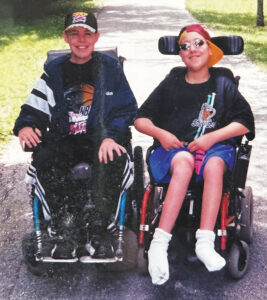 Isaac Banks, 41, of Illinois, who lives with limb-girdle muscular dystrophy (LGMD) and attended camps for 10 years, claims his first camp fears easily faded once he was surrounded by people like him. “No worries about people staring at my wheelchair — we were all in one. No concern about not being able to play the games — they were all designed for our needs,” he says. “My first time going to Summer Camp made me realize there is a big world, and there is room for me in it.”
Isaac Banks, 41, of Illinois, who lives with limb-girdle muscular dystrophy (LGMD) and attended camps for 10 years, claims his first camp fears easily faded once he was surrounded by people like him. “No worries about people staring at my wheelchair — we were all in one. No concern about not being able to play the games — they were all designed for our needs,” he says. “My first time going to Summer Camp made me realize there is a big world, and there is room for me in it.”
Summer Camp is where Isaac first saw others in wheelchairs successfully navigating life with disabilities. Eventually, he became one of those influential camp veterans. “My desire to be a motivational speaker came from talking with the younger kids as I tried to motivate them for greatness the way that I was motivated,” Isaac says. “I can honestly say that Summer Camp is the reason I am who I am.”
Volunteers Feel the Magic
The magic of Summer Camp would not be possible without the generous efforts of volunteers who make camp a reality year after year.
Many volunteers, moved by this transformative week, say they get as much out of the experience as the campers themselves.
“Medical team members tell us that it changes the way they provide care and interact with their patients,” Alicia says. “Some volunteers choose new career paths based on their time at camp. It’s life-changing for all involved.”
Tyler Snow, 45, of Indiana, who volunteered as a counselor for more than 16 years, credits Summer Camp with giving him a new perspective on life.
“My main job was to make sure the campers had the best week of their lives,” he says. He would often go above and beyond to entertain the campers in his care. Whether it was taking a whipped cream pie to the face or stuffing his mouth with marshmallows for a “chubby bunny” challenge, he embraced it, so campers could leave with epic stories to tell and photos to show all the fun that took place.
“Camp fills my cup, fills my soul, and revives my faith in humanity,” says Naomi Sullivan, RN, 45, of Illinois, a 12-year camp medical staff volunteer. Summer Camp has reminded her not to take life or her abilities for granted.
Alexander Fay, MD, PhD, 49, a pediatric neurologist in San Francisco, started volunteering at Summer Camp because he wanted to learn what his patients could do for fun outside of a clinical setting. He was moved by the selflessness of the counselors and the joy created at camp and went on to serve for five years as a camp doctor at multiple locations. “I try to carry the spirit of MDA Summer Camp with me through the rest of the year, because it reminds me that our calling is to serve each other,” he says.
Adapting to the Changing Landscape
As the world has changed in the last 70 years, MDA Summer Camp has evolved with it, incorporating new programming and exciting sponsors, enhancing safety protocols and policies, and, most importantly, expanding access to more youth with neuromuscular diseases.
Since 2020, MDA Virtual Summer Camp has provided an engaging and meaningful experience for kids and young adults to enjoy the feeling of Summer Camp from the comfort of their homes. Virtual campers join in on arts and crafts, STEM projects, and cooking activities and spend time connecting with their fellow campers and volunteers during Cabin Chat video calls.
While much has changed over the decades, one thing remains constant: Summer Camp is a place where campers find joy, independence, and newfound freedom as they try new things, forge new friendships, and embrace a week where the world is fully accessible.
For those of us who have had the pleasure of experiencing Summer Camp, the spirit of camp lives on forever in our hearts — a cherished time of camaraderie, connection, and maybe even some pranks.
Kelly Berger lives in Cincinnati and freelances in writing and digital marketing. She’s an avid music festival and concertgoer. Follow her journey at thekellyberger.com.
Next Steps and Useful Resources
- Learn more about becoming a camper or volunteer
- Stay up to date on Quest content! Subscribe to Quest Magazine and Newsletter.
Disclaimer: No content on this site should ever be used as a substitute for direct medical advice from your doctor or other qualified clinician.


